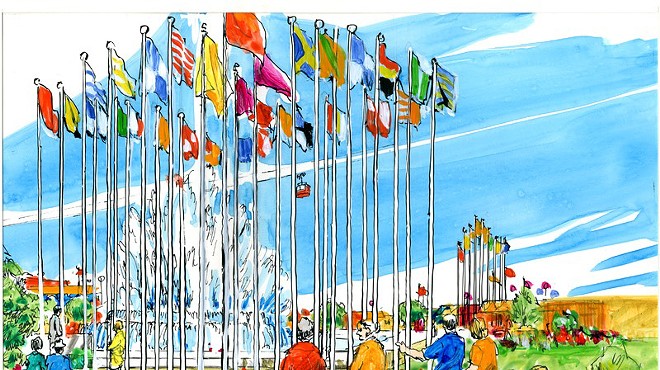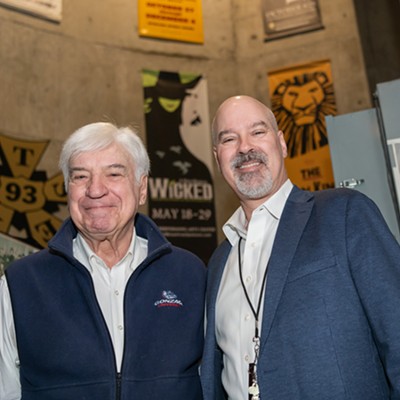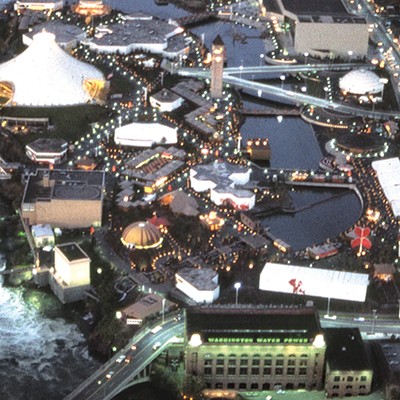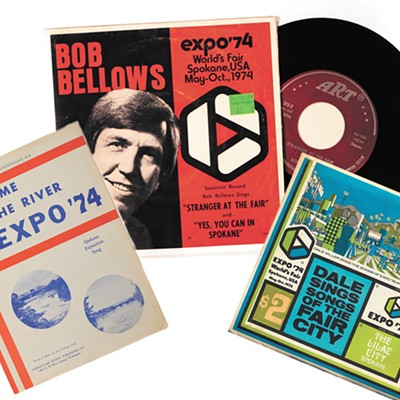
The "butterfly effect" describes the phenomenon that even small actions can have vast consequences. The effect was first described in 1972 by meteorologist Edward Lorenz, who discovered a minuscule alteration could drastically change the results of his weather simulation. He used the metaphor of a butterfly's gently fluttering wings having the power to spur a distant tornado.
The idea that small things can have lasting impacts is not unfamiliar in Spokane. In 1974, Spokane was the smallest city to host a world's fair and had a major turnout, with more than 5 million visitors that year.
Yet what would the city be like if Expo '74, that metaphorical butterfly flapping its wings, never happened?
The obvious answer is that Riverfront Park wouldn't exist as we know it. A collection of industrial railyards may still be partitioning downtown and preventing people from accessing and enjoying the Spokane River's roaring heart. Before Expo, the riverfront was also home to a burned-down warehouse, a laundry service and other industrial uses that left its shores and waters polluted with chemicals and debris. All of this was cleaned up before the fair and sparked the first work to address chemical pollution in the river, which continues today.
"We wouldn't have this central place for the people of Spokane to come build their own personal relationship with the river," says Amanda Parrish, executive director at The Lands Council, an Inland Northwest environmental nonprofit aimed at preserving and revitalizing forests, waters and wildlife.
Parrish is also the chair of the environmental pillar committee for Expo's 50th anniversary celebration. Community leaders were selected to help plan events for five pillars of the anniversary event, which tie to the fair's original themes and also include Expo's legacy, tribal culture, recreation and sport, and arts and culture.
Parrish says the event's 50th anniversary, just like its original run, is also a catalyst for environmental teamwork in the region.
"I've been working for 15 years in this field here in Spokane, and I do feel like right now there is a level of camaraderie and collaboration in the conservation community that's the highest I've ever seen," she says.
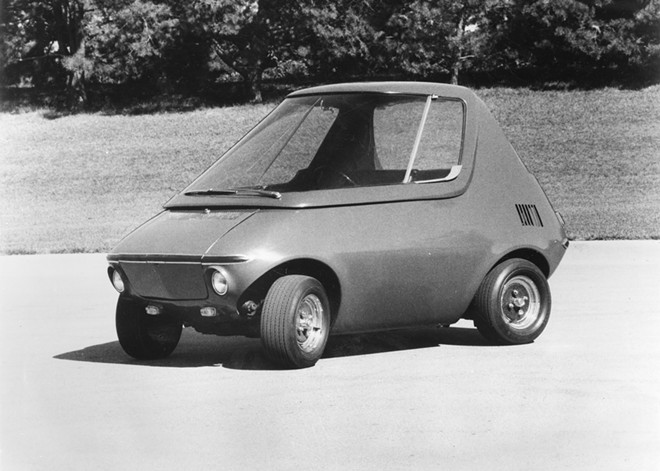
Many of the environmental issues still facing Spokane a half-century after Expo '74 — adaptability to climate change, protecting the river and species within it, reducing the amount of food and organic waste going into the region's waste-to-energy incinerator — involve solutions that are collaboratively driven, which is why working together is so important, Parrish says.
This modern collaboration harkens back to the teamwork that resulted in Expo '74 being so successful in the first place.
"I think we underestimate ourselves as a community sometimes in Spokane," says Brian Henning, director of Gonzaga University's Institute for Climate, Water, and the Environment. "Expo shows that we can do things that are bold and ambitious if we work hard enough at it and work together as a community, and that gives me a lot of hope."
Henning also speaks of Spokane's potential to be a national and global leader in environmental efforts. He says local work to eliminate phosphorus from laundry detergents resulted in a voluntary nationwide ban in 2010.
"There's this saying, where we're trying to create a movement, not a moment. I think of Expo in that way. There's some elements that are just a moment, a celebration," Henning says. "How do we also use it as an opportunity to support and nurture the local movement to do better in our relationship to the environment?"
Expo's 50th anniversary environmental stewardship pillar is working on just that. Part of the nine-week celebration's kickoff is the planting of 100 trees each day from May 7 to 11 as a tribute to the now-mature trees in Riverfront Park, first planted in 1974. The new saplings, tagged as a part of the new "Expo Forest," will be planted in areas where tree coverage is low as a part of a citywide goal to increase canopy coverage. The SpoCanopy program, led by The Lands Council and Spokane's Urban Forestry department, aims for every neighborhood to have at least 40% tree canopy coverage by 2030 and works to increase access to green spaces throughout the city.
Another sustainability-focused local group, Zero Waste Spokane, is working to make the 50th anniversary celebration as environmentally conscious — if not more so — as the original fair. Zero Waste Spokane is helping vendors and visitors to reduce waste during the opening ceremony (and during Bloomsday) by separating waste into bins for recyclable, compostable and burnable materials with the help of trained volunteers known as waste ambassadors.
Spokane Transit Authority is also offering free weekend fares for the duration of the celebration to encourage people to use public transit, with the hope that they'll continue to ride the bus after experiencing its ease and accessibility.
There are many other environmental events planned for Expo '74's 50th commemoration.
On Saturday, June 1, regional environmental organizations are taking over Riverfront Park's Vendor Village to present about regional conservation efforts. Groups for land preservation, trail building, public health, community outreach, endangered species and more will share how to get involved with their missions.
A legislative summit, free and open to the public, is also slated for June 21. The goal is to foster conversation between elected officials and community members and hopefully develop legislation that can go to Olympia in 2025. Organizers hope they'll be more effective than similar discussions hosted during the original fair. (Keep up with all events at Expo50Spokane.com.)
"In Expo '74 there were nice speeches and discussions, but in terms of launching novel, creative legislation, not so much," says Henning, adding that the event will be a "launching pad to do expanded environmental and climate work."
The 50th celebration serves as a reminder that while humanity still has a long journey ahead to make positive, lasting environmental change, we've also come a long way from using the Spokane River as a municipal dumping ground as recently as six decades ago.
While only one of the fair's five soaring butterfly sculptures remains today, overlooking Riverfront Park's northern entrance with its lilac wings frozen mid-flutter, it continues to symbolize everything Expo '74 accomplished and, with a barely perceptible sway in the wind, everything that is still to come.♦



